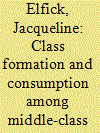|
|
|
Sort Order |
|
|
|
Items / Page
|
|
|
|
|
|
|
| Srl | Item |
| 1 |
ID:
104360


|
|
|
|
|
| Publication |
2011.
|
| Summary/Abstract |
This paper explores the role of consumption in defining Chinese middle-class identity by examining the consumption practices of urban professionals. It is widely agreed that China has a thriving middle class. The exact definition of this middle class, however, is disputed by scholars and the Chinese popular press. Debates about class are also manifest in the daily lives of urban professionals. One of the most interesting areas in which identity is contested is that of consumption. The research is based on 60 in-depth interviews among professionals conducted in Shenzhen in the period 2004-2010. New wealth means that the myriad of goods on offer is accessible to large sections of the urban population. Professionals have become keen and selective shoppers. Many describe their consumption practices as informed by their own highly individualistic taste. This paper argues that professional consumption practices sometimes express individual taste but, more importantly, serve to articulate a collective social identity.
|
|
|
|
|
|
|
|
|
|
|
|
|
|
|
|
| 2 |
ID:
187939


|
|
|
|
|
| Summary/Abstract |
China's expanding middle class is often found to support the regime and lack democratic aspirations. We find that one section of the middle class depends upon the state for jobs and other material benefits, and the other works for the private and foreign sectors of the country's economy. Once separated as such, we found that the non-state middle class clearly shows lower support for the regime. Furthermore, unlike the state middle class, which registers lower democratic support, the non-state middle class shows a similar level of democratic support as other social classes. In general, however, while only pragmatically accepting the current order, both middle class groups nonetheless appear lacking practical knowledge and understanding of liberal democratic institutions such as free media and multiparty elections. The unforthcoming attitudes toward democracy might also derive from a general sense of fearing the loss of order and the other related uncertainties.
|
|
|
|
|
|
|
|
|
|
|
|
|
|
|
|
| 3 |
ID:
145132


|
|
|
|
|
| Summary/Abstract |
This article explores the seemingly paradoxical attitudes of the Chinese middle class towards democracy, social stability, and reform. Using fieldwork data from Ningbo, this article shows that a group of objective, middle-class individuals can concurrently display high levels of support for democratic principles and low levels of participation in real-life socio-political events. Being generally confident in China’s social stability, these individuals have little to no desire for significant democratic reform, or indeed any reform that occurs outside the purview of the state, as it is considered destabilising. By highlighting the distinction between how these members of the middle class respond to generic democratic concepts, real-life sociopolitical affairs, and the idea of democratic reform, this article argues that the Chinese middle class are aware of what “should be,” what “could be,” and what “is,” which lends their socio-political attitudes a paradoxical appearance.
|
|
|
|
|
|
|
|
|
|
|
|
|
|
|
|
|
|
|
|
|